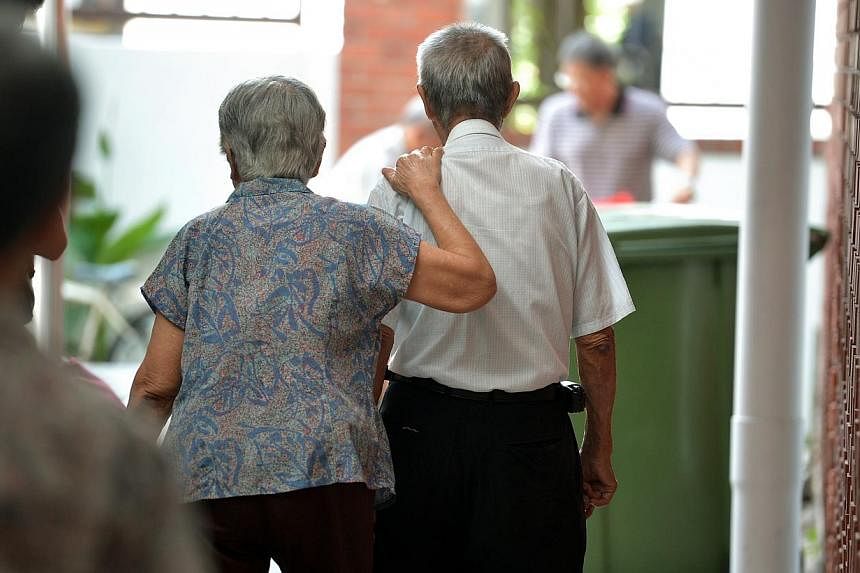Last August, Prime Minister Lee Hsien Loong sketched out elements of an old age support scheme in his National Day Rally speech.
The Silver Support Scheme, as he named it, aims to top up the incomes of older Singaporeans (aged 65 or above) who have not accumulated sufficient retirement savings during their working life.
It aims to pay an amount to help eligible low-income elderly persons with their living expenses. This is on top of existing financial assistance schemes from the Government and the community.
Details are expected to be announced on Budget Day next Monday. Given Singapore's approach to social welfare, the scheme can be expected to keep to general principles of fairness, efficiency and sustainability.
On fairness, the scheme is born out of a recognition that the lives of some of Singapore's elderly have not improved in parallel with Singapore's rapid economic development. They might have worked hard in their younger days when Singapore was poor, and grown old as Singapore became developed - and more expensive. Reducing their burden would be seen as a fair move by society.
This is one rationale behind the recently introduced Pioneer Generation Package (PGP) of health subsidies. The criteria for this is by cohort: those born on or before Dec 31, 1949, and naturalised as citizens as at Dec 31, 1986.
The Silver Support Scheme (SSS) will likely apply age-based eligibility criteria (perhaps 65 years or older, but without a date-of-birth criterion). Unlike the PGP, which is for all regardless of income, the SSS will probably be subject to income and asset means-tests.
This helps make sure the scheme is efficient in targeting only those who need the monthly payouts for their living expenses, and is sustainable fiscally.
Who might be eligible?
The National Survey of Senior Citizens conducted in 2011 (NSSC 2011) showed 12 per cent of those aged 65-74 years and 21 per cent of those aged 75 or over had monthly income of less than $500. This would suggest that about 30,000 recipients, or 15 per cent of the current population aged 65 years or above, might be eligible. This is consistent with PM Lee's statement that there was a group of 10-20 per cent of senior citizens for whom the Government and the community should do more.
The NSSC 2011 data also showed that only a small proportion (less than 8 per cent) of senior citizens aged above 65 counted upon their Central Provident Fund (CPF) payouts as a main source of income, possibly because they had insufficient such savings.
Most respondents in the NSSC 2011 relied upon income transfers from their children, on personal savings apart from CPF and on continued employment. The proportion of those able to get income from work understandably declined with age.
These findings suggest that the SSS will benefit not just the low-income senior citizens who qualify, but also their children who might themselves be facing financial stress. For this inter-generational benefit to be more effective, however, the income tests for eligibility must not be applied overly strictly when applied to the potential beneficiary's children.
The SSS will also go beyond the existing Public Assistance (PA) scheme that provides financial assistance to people of all ages who are permanently unable to work.
These include residents whose monthly payouts from CPF or other public pension schemes are below $450 a month for a single-person household ($790 for two persons). The elderly with children who are low-income themselves (earning $1,700 or less a month) and unable to support their parents can also benefit from PA. In 2013, there were just 3,164 recipients of various ages under this scheme.
If the SSS is, however, meant to benefit a larger group, then the eligibility criteria must be less restrictive than the PA scheme's, perhaps by raising the monthly payout threshold and/or the qualifying income levels of the potential beneficiary's children.
Assuming the monthly payout threshold is raised to $500 and the family income and asset means-tests are made less restrictive such that about 30,000 elderly persons aged above 65 (with monthly income less than $500) become eligible for the SSS, this would mean that each SSS recipient would receive monthly payouts to raise his/her monthly income to $500.
The scheme would cost a maximum of $180 million a year, only 0.3 per cent of government expenditure in Budget 2014. Whilst larger than the $51 million budgeted expenditure on the Comcare and Social Support Programme as a whole last year, this sum should easily be financed from current tax revenues, and would be sustainable in the long term even as the population ages. This would also have the benefit of reserving the existing PA scheme for those below the age of 65.
Enhancing social safety net
Some attention should be paid to how the SSS fits within the country's increasingly complex social safety net, especially in the context of changes in health care and medical insurance coverage and in the CPF system of retirement finance.
Low-income individuals and families (of all ages) who are unable to work may already tap government support through PA and other financial assistance schemes under Comcare, over and above that provided by community organisations.
The SSS should not be too restrictive. But it also has to avoid being overly generous and thereby crowding out values such as filial piety and strong familial support.
When it comes to implementation, it is important that anew scheme with specific eligibility and qualification criteria does not add more confusion and layers that prevent the needy from getting the help they need.stopinion@sph.com.sg
Christopher Gee is a Research Fellow and Yap Mui Teng is a Senior Research Fellow at the Institute of Policy Studies, NUS. They do research on demography and family issues.


